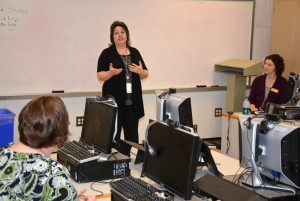
Marianne Durling of Granville Health System speaks to VGCC students, as instructor Hollie Garrett (seated at right) listens. (VGCC photo)
Vance-Granville Community College hosted a guest speaker in April to discuss careers in Medical Coding, as the college is preparing to offer a new opportunity for training in that field.
VGCC Medical Office Administration students had the opportunity to hear from Marianne Durling, Director of Health Information Management at Granville Health System and president of the Oxford chapter of the American Academy of Professional Coders (AAPC).
Durling told students that she has had a long, varied career in health care, starting as a certified nursing assistant. She later moved into medical coding/billing, consulting, administration and training. Durling has also taught at VGCC, Durham Technical Community College and Piedmont Community College.
Durling offered insights on careers related to medical coding. She said that most students interested in coding want to work in hospitals, but they might be overlooking other opportunities. “Hospitals are great, but they don’t suit all personalities, and it may be better for you to work in a doctor’s office, urgent care, or ambulatory surgery center,” Durling said. “That setting would generally give you more interaction with patients and other professionals and would offer you more varied job responsibilities beyond coding.” She added, “I love where I am, and the team I work with at Granville Medical Center.” Durling went on to discuss various credentials and specialties students might want to pursue through organizations like AAPC and the American Health Information Management Association (AHIMA).
She said that the impending transition to ICD-10 (set for Oct. 1, 2015), the tenth revision of the system used to report medical diagnoses and inpatient procedures, should create many temporary and permanent job opportunities in medical coding. “Not only will there be jobs, but this change will be good for new people in the market, because even as someone new, you will be on the same level as almost everyone else dealing with the new system,” Durling said. She invited students to attend meetings of her AAPC chapter to learn more about the field and network with professionals.
VGCC will be offering the Medical Coding curriculum certificate program in a new format this fall at the college’s South Campus, located between Creedmoor and Butner. The program will be scheduled in a uniquely accelerated fashion that allows students to complete the 14-credit-hour certificate over two semesters.
Five courses are required for the Medical Coding Specialist Certificate: Medical Terminology I and II (OST 141 and 142), Procedure Coding (OST 247), Diagnostic Coding (OST 248) and CPC Certification (OST 249). The last course prepares students to sit for the “Certified Professional Coder” exam offered by the AAPC.
“In just two semesters, a student can complete the first step to starting a career in medical coding and billing,” said Christal Swilley, who oversees the certificate as program head for Office Administration at VGCC. “Medical coding and related career fields have grown in recent years and are expected to continue growing, as the demand for health services increases and insurance continues to change.
Once students complete the Medical Coding certificate, these courses can be applied to the Associate in Applied Science degree in Medical Office Administration.
Orientation and advising of new students is taking place throughout the summer. The fall semester begins Aug. 17.
For more information, contact Christal Swilley at (252) 738-3325 or swilleyc@vgcc.edu.